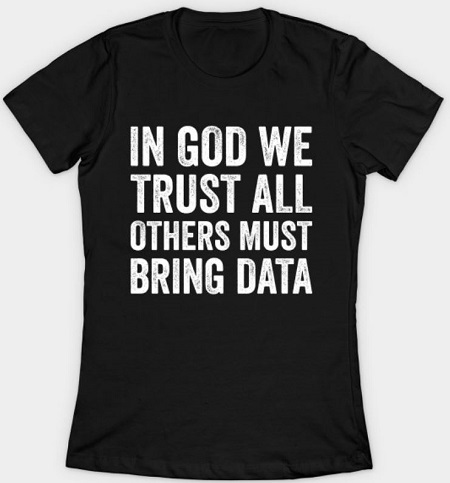In God We Trust, All Others Bring Data
by Stacey BarrDeming’s famous t-shirt quote, in God we trust, all others must bring data, is extreme. Is it too extreme?

One of my recently discovered favourite quotes about measurement is this:
One measurement is worth a thousand expert opinions. — Donald Sutherland
It’s a lot like a much more famous quote (which I had on a t-shirt once):
In God we trust; all others must bring data. — W. Edwards Deming
One of the primary reasons I cannot watch the media for news is that it is rife with opinions. Even when they use data, they manipulate it to support the opinions. And, over time, the opinions regularly contradict each other.
The media is not a vehicle for the whole truth. It’s not even a vehicle for enough of the truth to support reliable conclusions.
Opinions might be fast and easy and more emotive than data, but rarely are they anywhere near as close to the truth as good data. Opinions save time and effort early, but cost many more times their worth later. Data might cost time and effort early, but it returns many more times its worth later.
But that’s not to say that experts cannot bring wisdom to a situation. Data is useful only when we ask the right questions. And experts are those with enough experience to know the right questions. They are very important leaders of the acquisition and interpretation of the right data.
We could augment what Deming said to be more like “in credible experts we trust; all others must bring data”. But I prefer to say something like this:
When we ask the right questions about the results that matter, we can more easily find the right data and information for evidence-based decisions that improve those results faster and with less effort. Opinion-led decisions take much longer and much more effort, often for much less (if any) improvement.
Opinions might be fast and easy and more emotive than data, but rarely are they anywhere near as close to the truth as good data.. [tweet this]
Connect with Stacey
Haven’t found what you’re looking for? Want more information? Fill out the form below and I’ll get in touch with you as soon as possible.
167 Eagle Street,
Brisbane Qld 4000,
Australia
ACN: 129953635
Director: Stacey Barr




